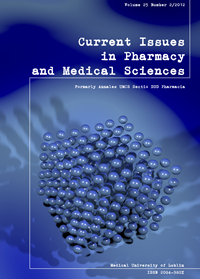The patients’ subjective assessment of health status after myocardial infarction
DOI:
https://doi.org/10.12923/j.2084-980X/25.2/a.04Keywords:
myocardial infarction, quality of life, subjective assessment of health statusAbstract
Chronic disease process, regardless of the phase or intensity affects the quality of life of the patient. The purpose of the study was to analyze the quality of life of patients after myocardial infarct based on self-evaluation and identification of variables affecting the subjective assessment of patients. The study included 268 patients after myocardial infarct. The research tool was a questionnaire survey developed by the authors. The subjective assessment of the health status of patients was analyzed as well as the influence of gender, age, education, place of residence, time elapsed between the occurrence of disease, material conditions, and knowledge about the infarction. It was found that patients after the incident of myocardial infarct, when assessing health, usually rate it as good and satisfactory, avoiding the extreme assessments. Subjective evaluation was associated with the selected variables. The health condition was better assessed by the youngest patients, the persons to 30 years of age and the oldest-above 70 years as well as better educated people, having a good material situation, living in the city, ant those patients whose disease occurred over a year before and having knowledge of the disease. Medical personnel were often the source of information on heart failure, and to a lesser extent the Internet and mass media. Family members of the patient should have the knowledge of myocardial infarction and its consequences to give him support in further treatment and rehabilitation, as well as prevent against disease incidents in the future.
References
1. Berra K. et al.: Planowanie i stosowanie programów rehabilitacji kardiologicznej. Rehabilitacja Medyczna, 6, 47, 1998.
2. Borowiak E. et al.: Analiza porównawcza wpływu cukrzycy i przebytego zawału serca na jakość życia pacjentów. Probl. Piel., 17, 86, 2009.
3. Burström K., Johannesson M and Diderichsen F.: Swedish population health-related quality of life results using the EQ-5D. Qual. Life Res., 10, 621, 2001
4. Dudek D. et al.: Depresja w chorobie niedokrwiennej serca. Przegl. Lek., 56, 302, 1999.
5. Gaziano J.M., Mason J.E. and Ridker P.M.: Primary and Secondary Prevention of Coronary Heart Disease. In: Braunwald E., D.P. Zippes and P. Libby (editors): Heart Disease. Phladelphia, Londyn, New York, ST. Louis, Sydney, Toronto: Harcourt International Edition; p. 1040, 2000.
6. Janion M., Bąkowski D.: Zmiana stylu życia jako istotna terapia po zawale serca. Przegl. Lek., 57, 469, 2000.
7. Kawczyńska-Butrym Z: Samoocena zdrowia mieszkańców osiedli byłych państwowych gospodarstw rolnych. Zdr. Publ., 113, 23, 2003.
8. Opolski G.: Opieka kardiologiczna w Polsce - stan obecny, perspektywy, zagrożenia, w opinii krajowego nadzoru specjalistycznego. Kardiologia i onkologia w Polsce na początku XXI wieku. Stan, wyzwania i perspektywy. I Kongres Demograficzny Warszawa; p. 57, 2002.
9. Ostrowska A. (editor): Styl życia a zdrowie. Z zagadnień promocji zdrowia. Warszawa: Wyd. IFiS PAN; p.120, 1999.
10. Ridker P.M., Genest J. and Libby P.: Risk Factors for Atherosclerotic Disease. Philadelpia, London, Nowy Jork, Saint Louis, Sydney, Toronto: Harcourt International Edition; p. 1010, 2000.
11. Turczyn-Jabłońska K., Waszkowska M.: Przystosowanie do pracy osób po zawale serca - rozważania modelowe. Med. Pr., 56, 41, 2005.
12. van Jaarsveld C.H. et al.: Changes in health-related quality of life in older patients with acute myocardial infarction or congestive heart failure: a prospective study. J. Am. Geriatr. Soc., 49, 1052, 2001.
13. Wu N. et al.: Quality of life in people with multiple sclerosis: data from the Sonya Slifka Longitudinal Multiple Sclerosis Study. J. Health Hum. Serv. Adm., 30, 233, 2007.
14. Żmurowska B.: Wpływ cukrzycy na jakość życia. Pol. Med. Rodz., 5, 513, 2003.
Downloads
Published
Issue
Section
License
Copyright (c) 2012 Authors

This work is licensed under a Creative Commons Attribution-NonCommercial-NoDerivatives 3.0 Unported License.


